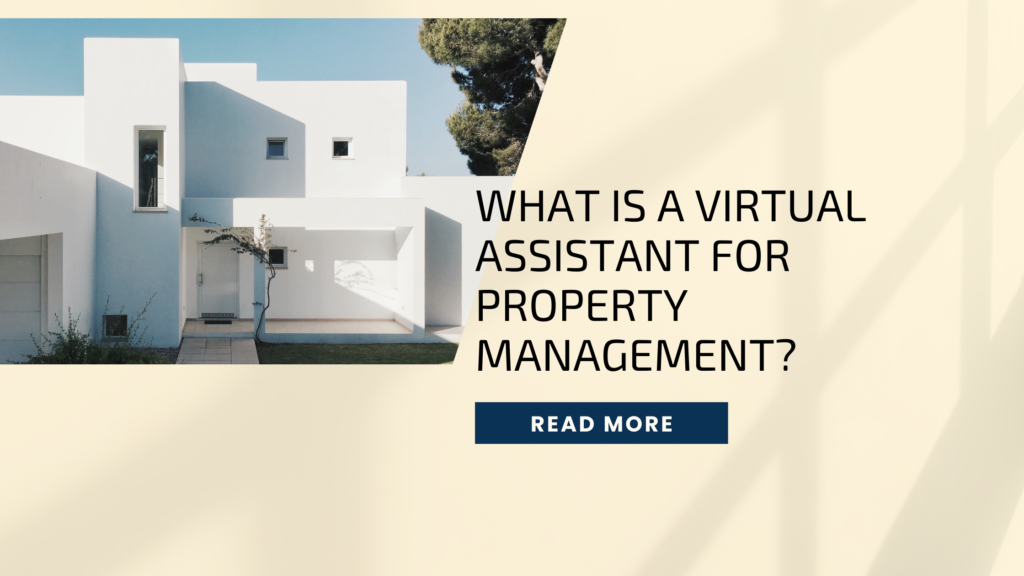
What Is a Virtual Assistant for Property Management?
In the fast-paced world of real estate, property managers are constantly juggling tenant issues, maintenance coordination, lease renewals, rent collection, and marketing tasks. As portfolios grow and the demand for round-the-clock responsiveness increases, the need for reliable, scalable support has led to the rise of virtual assistants (VAs) in property management.
But what is a virtual assistant for property management, exactly? And why are more landlords, brokers, and real estate firms in the US and UK outsourcing these roles to remote professionals? Let’s dive deep.
Understanding the Role: What Does a Property Management Virtual Assistant Do?
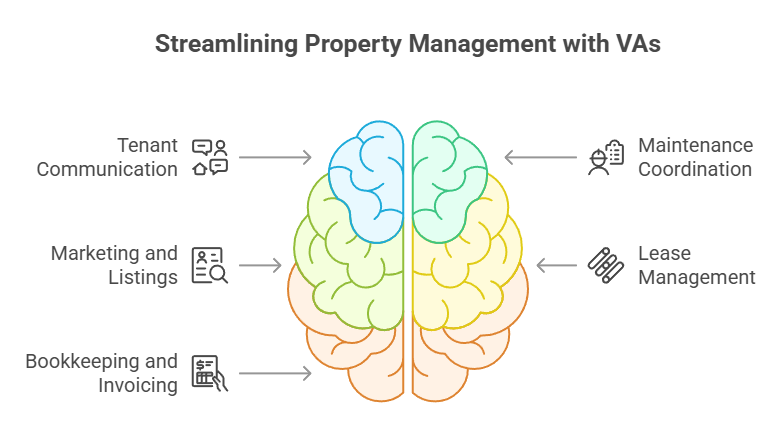
A virtual assistant for property management is a remote professional who provides administrative, operational, and client-facing services tailored specifically for landlords, property managers, real estate agents, and housing firms. These VAs are trained in property-related workflows and often familiar with tools like Buildium, AppFolio, Rentec Direct, and CRM software.
Typical responsibilities include:
1. Tenant Communication:
Responding to inquiries, scheduling property tours, managing complaints, and handling lease-related concerns.
2. Maintenance Coordination:
Logging maintenance requests, liaising with vendors, scheduling repairs, and following up with tenants.
3. Marketing and Listings:
Posting vacancies on platforms like Zillow or Rightmove, managing property photos, and optimizing descriptions for visibility.
4. Lease Management:
Drafting lease agreements, sending renewal reminders, and managing digital signature workflows.
5. Bookkeeping and Invoicing:
Tracking rent payments, generating invoices, reconciling expenses, and preparing financial summaries.
Many firms use these VAs to streamline operations and reduce time-consuming manual tasks, enabling managers to focus on tenant retention and property acquisitions.
Why Property Managers Are Turning to Virtual Assistants
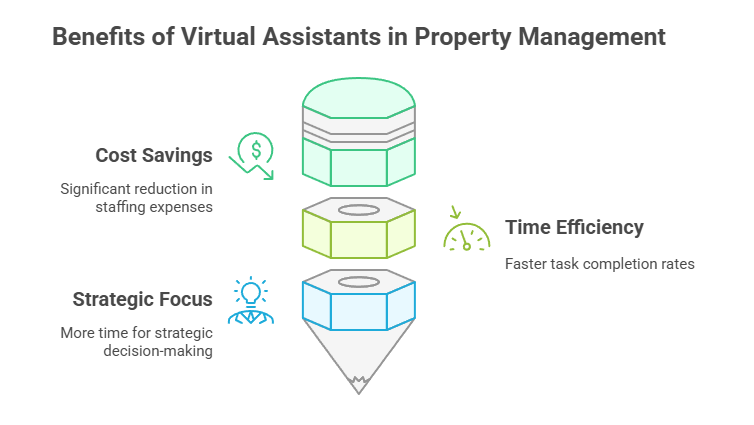
The surge in popularity of real estate VAs is not just a trend—it’s backed by data and results. According to a Grand View Research report, the property management software and services industry is growing steadily, expected to reach $23.6 billion by 2028. Alongside this, the demand for flexible workforce solutions like virtual assistants has exploded.
Here are the key reasons why:
1. Cost Savings of 50% to 85%
Hiring an in-house assistant in the US or UK can cost upward of $35,000 annually. In contrast, a virtual assistant based overseas can deliver equivalent support at a fraction of the price—saving businesses between 50% and 85% on staffing costs.
2. Time Efficiency: +30% Task Completion Rate
A VA trained in property workflows can complete repetitive administrative tasks 30% faster than traditional in-house employees, thanks to their specialization and digital-first approach.
3. 20+ Hours Saved Per Week
On average, property managers spend over 20 hours weekly handling emails, scheduling, maintenance calls, and financial tracking. Delegating these to a VA frees up time for strategic decision-making, portfolio growth, and tenant relations.
Real Estate Tasks Perfectly Suited for a VA
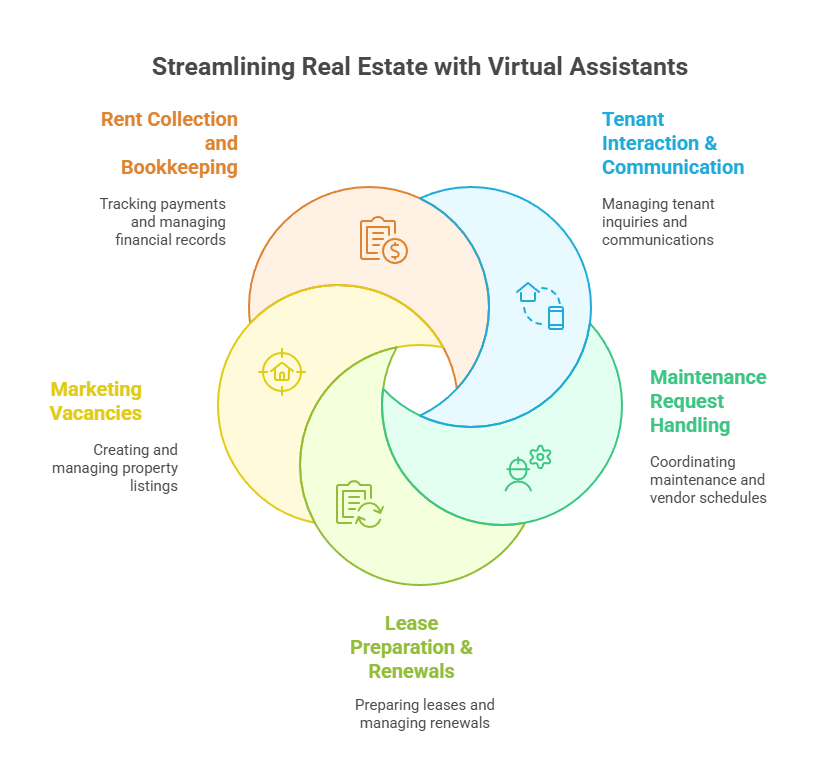
Let’s break down the most valuable tasks you can delegate to a virtual assistant in property management:
1. Tenant Interaction & Communication
VAs can monitor shared inboxes, respond to leasing queries, and follow up on complaints. They manage communications via email, phone, and CRM—ensuring no tenant request goes unanswered.
2. Maintenance Request Handling
From logging the issue to scheduling with plumbers, electricians, or cleaning teams, VAs are adept at coordinating with vendors and keeping maintenance cycles organized in platforms like Buildium or Monday.com.
3. Lease Preparation & Renewals
VAs can prepare standard lease agreements, manage DocuSign workflows, and send automated reminders for renewals—reducing missed deadlines and maintaining compliance.
4. Marketing Vacancies
Creating optimized listings for rental platforms (e.g., Rightmove, Zillow, or Facebook Marketplace), managing photos, writing compelling property descriptions, and tracking leads can be efficiently managed by VAs trained in marketing.
5. Rent Collection and Bookkeeping
Using tools like QuickBooks, Xero, or FreshBooks, VAs can track rent payments, issue late notices, record expenses, and generate monthly summaries for property owners.
The ROI: Why Virtual Assistants Make Financial Sense
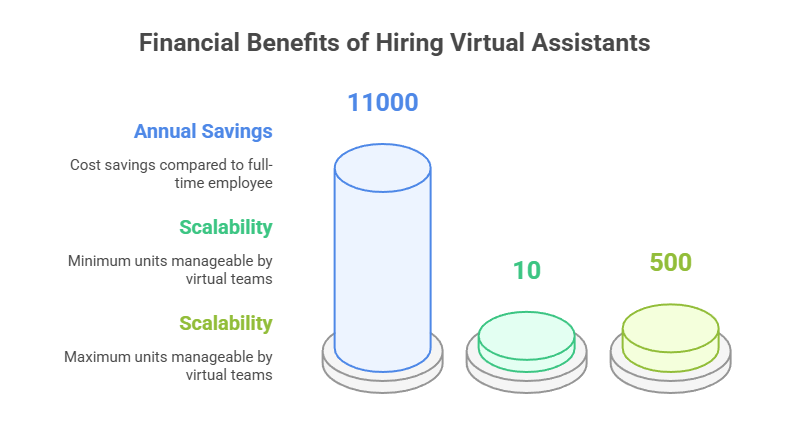
The return on investment is compelling:
-
Annual savings from hiring a VA instead of a full-time employee can exceed $11,000 per assistant.
-
Virtual teams allow scalability—whether managing 10 units or 500 units, VAs can be onboarded rapidly.
-
With improved tenant response times and fewer missed maintenance requests, property owners report higher tenant retention and better online reviews.
Moreover, the VA market is expected to reach 8.4 million jobs by 2028 globally, signaling both adoption and availability for quality hires.
Who Should Hire a Property Management VA?
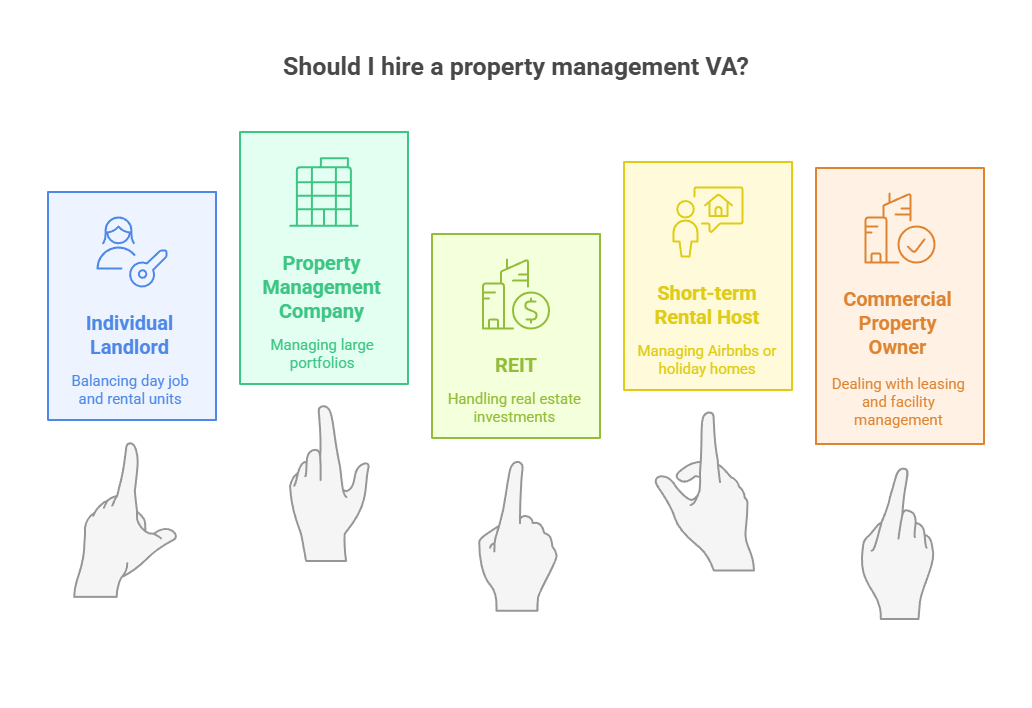
VAs aren’t just for large property firms. The following types of professionals benefit the most:
-
Individual landlords juggling day jobs and rental units
-
Property management companies managing large portfolios
-
Real estate investment trusts (REITs)
-
Short-term rental hosts managing Airbnbs or holiday homes
-
Commercial property owners dealing with tenant leasing cycles and facility management
TaskVirtual: Your Trusted Partner in Property Management Support
If you’re ready to explore what a virtual assistant for property management can truly offer, TaskVirtual is a top-tier solution trusted by real estate professionals in both the US and UK.
Why Choose TaskVirtual?
1. Expert Consultation:
Get tailored advice on how to integrate VAs into your property workflow, including help with CRM, lease systems, and tenant engagement platforms.
2. Affordable Pricing:
Plans start from just $3.12/hour to $14.99/hour, making it one of the most cost-effective real estate outsourcing solutions in the market.
3. Client-Backed Reputation:
TaskVirtual has earned 364+ positive reviews and holds a 4.7-star rating on virtual assistant review platforms.
4. Specialized Services:
Includes property listings, rent tracking, calendar management, document digitization, and vendor coordination.
5. Scalability:
Easily scale your team as your property portfolio expands—without worrying about payroll, overhead, or training delays.
Whether you’re handling residential, commercial, or mixed-use properties, TaskVirtual’s trained VAs can act as an extension of your office, minus the physical desk.
Visit TaskVirtual to get started.
Final Thoughts: The Future Is Virtual
So, what is a real estate virtual assistant for property management? It’s not just a cost-saving hire—it’s a strategic asset. From reducing operational burdens to enhancing tenant satisfaction and optimizing backend systems, VAs are becoming indispensable to real estate operations.
In a competitive property market—whether in the US or the UK—the winners will be those who delegate smartly, automate wisely, and scale flexibly. And virtual assistants are right at the heart of this transformation.






